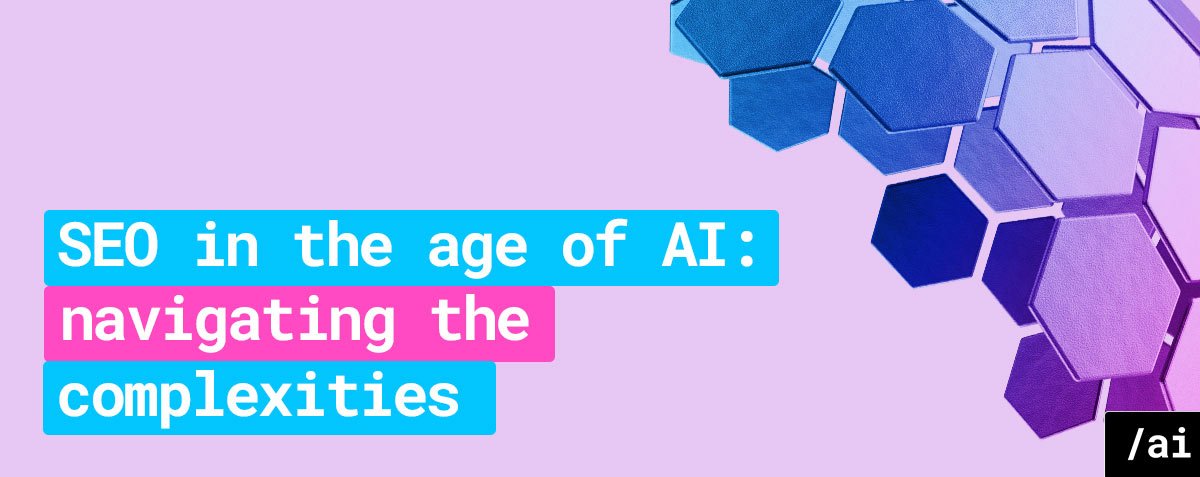
Contents

SEO has drastically transformed since its birth.
From keyword stuffing just to rank on the search engine to following an intent-based approach, we’ve come a long way.
With Google updating its algorithm now and then, it’s clear that the search engine giant is keen to rank pages based on their quality, relevance, context, and of course authority. Especially since the advent of AI, Google’s way of analyzing, and ranking content has changed.
As an SEO professional, you need to adapt to these changes to stay competitive…..
This article discusses the impact AI has had on SEO and how to navigate these changes like a pro.
The impact of AI on SEO
Today, Google doesn’t just match keywords and generate results based on keyword volume. It also assesses and grasps nuance and intent behind those keywords. For that, most search engines are now using Natural Language Processing (NLP) and semantic search to dissect every search query and generate helpful results for the users.
So, how does NLP work?
It breaks down sentences into terms, and parts of speeches and understand how the words are related to each other. Google’s NLP algorithms are adept at recognising entities within a search query, such as people, places, organisations, or concepts. By identifying these entities, Google can better understand the context of the query and provide more relevant results.
The algorithms also take into account the user’s search history, location, device type, and other contextual factors to further refine the understanding of the search query and tailor the results accordingly.
Another major impact would be the introduction of AI content creation tools that can help you generate content at scale. So, creating content just for the sake of matching keywords won’t do anymore, as these AI tools can produce similar or even better content within seconds. What you really need is a more nuanced approach to writing with thought leadership and offering value in mind.
1. Use video transcription to level up your SEO
Your YouTube videos are a goldmine of information you could be sharing with a broad audience, including those who are deaf or hard of hearing and those who prefer reading over watching videos. This is something video transcription software can help you with.
Using AI, they automatically transcribe YouTube video to text within minutes, allowing you to reach and attract more visitors to your website. Providing a transcript alongside your videos improves the user experience by giving viewers the option to read along while watching or to skim through the text to find specific information. This flexibility caters to different learning preferences and browsing habits, resulting in higher viewer satisfaction and engagement.
But, how does this help with SEO?
Video transcripts contain the spoken words within the video, which can include valuable keywords and phrases relevant to your content. By transcribing your videos, you create additional text-based content that search engines can crawl and index, increasing the overall keyword density of your webpage and improving its relevance to search queries.
You can capture long-tail keywords and phrases that may not be present in the video title or description.
Long-tail keywords typically have lower competition but higher relevance to specific search queries, making them valuable for attracting targeted traffic to your website.
Moreover, video transcripts can appear as featured snippets in search results, especially for queries that trigger video results. Having your content featured as a snippet can significantly increase visibility and drive more traffic to your website.
2. Partner with an SEO agency
SEO can be a long-term game—waiting for results can get frustrating particularly when you’re new to it. Outsourcing your SEO operations to a third-party agency can be the best option in this case.

They take care of all your SEO tasks for you so you can focus on the other important aspects of your business. Plus, they usually have a track record of generating results for other businesses like yours, which helps you choose the right one for you.
Let’s say you’re looking for an SEO agency in Birmingham. All you need to do is look for an SEO agency Birmingham has to offer with experience in helping businesses from your niche.
That’s right. When you’re looking for specific results and good expertise to level up your SEO efforts in your niche, it’s better to look for a niche-focused agency rather than a generic one.
They use AI-based SEO tools and their team of SEO experts to get you the desired results in less time and help you scale your business.
3. Using AI as an assistance
AI is not a replacement for your content teams—it is, in fact, an assistant that helps them create better quality content avenues for your SEO strategy. While AI can generate drafts, write meta tags, Frequently Asked Questions (FAQs), and basically generate every form of content you need, it doesn’t generate publish-ready content.
You still need human intelligence to fact-check, edit, rewrite, optimize, and organize a piece of content before you can hand it over to the search engines.
Use AI tools like ChatGPT and Bard to create first drafts for a keyword, find interesting examples and anecdotes, or simply understand a new topic in the simplest way possible.
You can also use AI for other SEO tasks such as:
- Keyword research to prioritise your content creation efforts based on search volume and competition.
- Content development and optimisation by analysing on-page elements such as titles, headings, and meta tags. AI-powered content optimization tools can provide recommendations for improving readability, keyword density, and overall SEO performance to help your content rank higher in search results.
- The predictive analysis forecasts future trends and identifies potential opportunities for SEO optimization.
- Link building by analyzing backlink profiles and identifying opportunities for link building and outreach.
Leverage AI in these ways, and you will be able to optimize your SEO efforts, improve your search engine rankings, and drive more organic traffic to your website
4. Leverage NLP for SEO
Leveraging natural language processing (NLP) can significantly enhance your SEO efforts by helping you better understand and cater to the intent behind user queries.
Here are some tips:
- Use NLP tools to identify not just specific keywords but also related phrases and synonyms that users might use when searching for your content.
- Develop content that aligns with the intent behind search queries. NLP can help you understand the context and semantics of user queries.
- NLP can help you identify long-tail keywords and phrases that have lower competition but higher relevance to specific user intents. Create content that targets these long-tail keywords to attract more targeted traffic to your site.
- Implement structured data markup on your website to provide search engines with more context about your content.
- Optimize your content for voice search by using conversational keywords, answering the FAQs, focusing on local optimization, and aiming for featured snippets.
- Use NLP-powered analytics tools to monitor and analyze the performance of your content in search results. Pay attention to user engagement metrics, such as click-through rates and time spent on a page, to gauge the effectiveness of your SEO efforts and make adjustments as needed.
This will help you understand the workings of the search engines better and create content that aligns with what your target audience is looking for.
5. Focus on user experience
While AI assists you with a lot of content production and SEO tasks, it gives you a chance to focus on the strategic side of SEO. You can focus on prioritizing user experience to make your website your visitors’ favorite.
Here are all the areas you can touch upon using AI:
- Improving website usability: Use AI creative ops tools to build clear navigation menus, logical page layouts, and intuitive interface elements. This helps you ensure that users can easily access your content and complete desired actions, such as making a purchase or filling out a contact form.
- Creating visually appealing design: Incorporate branding elements, attractive visuals, and cohesive layouts in your website design that reflect your brand identity and resonate with your target audience.
- Providing clear navigation: Organize content into logical categories, and use search functionality for easy access to specific information.
- Optimizing speed: Improve your page load speed through techniques such as image optimisation, caching, and minification of CSS and JavaScript files. AI algorithms can analyse website performance metrics and identify opportunities for optimisation to improve speed and responsiveness.
AI can assist in this process by providing insights, personalisation, automation, and optimisation capabilities that help create a seamless and engaging user experience.
Use AI to maximise your SEO efforts
Using AI in SEO involves leveraging advanced algorithms and technologies to optimize various aspects of your website and content for search engines.
AI-powered tools can analyze vast amounts of data to identify keyword opportunities, analyze user intent, and predict search trends, allowing you to tailor your SEO strategy accordingly.
AI can also automate tasks such as content generation, optimization, and link building, freeing up your time to focus on strategic initiatives.
So, use AI to your advantage to gain valuable insights, streamline your SEO processes, and drive more organic traffic to your website, and improve your website visibility, engagement, and conversions.


